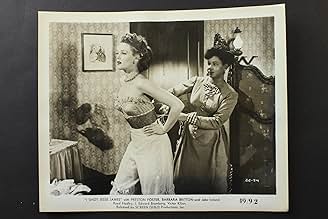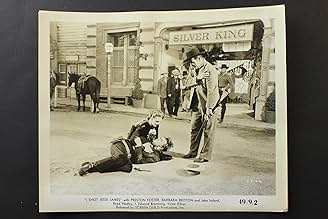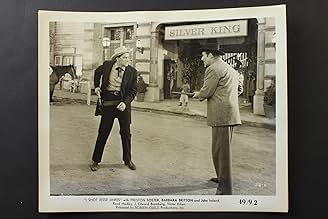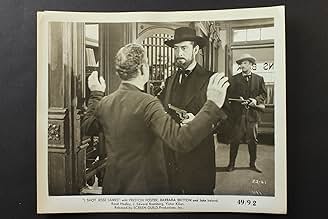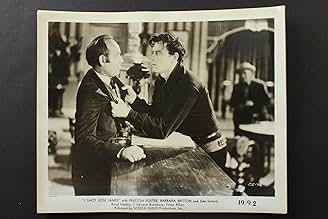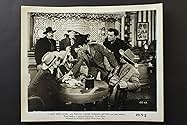CALIFICACIÓN DE IMDb
6.8/10
2.6 k
TU CALIFICACIÓN
Bob Ford decide matar a su mejor amigo, Jesse James, para salir del mundo del crimen y así poder casarse con su novia, pero se ve consumido por la culpa y el tormento psicológico.Bob Ford decide matar a su mejor amigo, Jesse James, para salir del mundo del crimen y así poder casarse con su novia, pero se ve consumido por la culpa y el tormento psicológico.Bob Ford decide matar a su mejor amigo, Jesse James, para salir del mundo del crimen y así poder casarse con su novia, pero se ve consumido por la culpa y el tormento psicológico.
- Dirección
- Guionistas
- Elenco
Tommy Noonan
- Charles Ford
- (as Tom Noonan)
Barbara Wooddell
- Mrs. Zee James
- (as Barbara Woodell)
Phillip Pine
- Man in Saloon
- (as Phil Pine)
Victor Adamson
- Townsman
- (sin créditos)
Fred Aldrich
- Townsman
- (sin créditos)
Phil Bloom
- Townsman
- (sin créditos)
- Dirección
- Guionistas
- Todo el elenco y el equipo
- Producción, taquilla y más en IMDbPro
Opiniones destacadas
Sam Fuller's directorial debut is more of a character study than a traditional western. John Ireland stars as Bob Ford, who kills his friend Jesse James in order to get immunity for his past crimes so that he can settle down with the girl he loves. Wracked with guilt and feelings of inadequacy, Ford pursues the girl in the face of a rival for her heart. Fuller hasn't fully developed his dynamic style yet, in fact, this feels more like a low budget Nicholas Ray film than a Fuller film. A scene where Ford forces a dude to sing the ENTIRE song about Jesse James being killed by "that coward Robert Ford" is priceless and worth the price of admission.
Sam Fuller's first film direction is a version of what happened to Robert Ford (John Ireland), the man who famously killed his friend - Jesse James (Reed Hadley).
Taking up the basic elements of the real life story, Fuller keeps the narrative tight whilst ensuring the complexities of the main characters come to the fore. All the quirks and peccadilloes of the human condition are explored (the detail of Ford's torments and troubles superbly told), which is something of a rarity for a late 1940s "B" standard Western. The use of close-ups are to purposely highlight the psychological discord on show, marking this out as a good pointer to the later work of its maverick director. Ernest Hiller photographs the exteriors out of Iverson Ranch in Chatsworth and support to Ireland comes from Preston Foster, Barbara Britton and J. Edward Bromberg. 7/10
Taking up the basic elements of the real life story, Fuller keeps the narrative tight whilst ensuring the complexities of the main characters come to the fore. All the quirks and peccadilloes of the human condition are explored (the detail of Ford's torments and troubles superbly told), which is something of a rarity for a late 1940s "B" standard Western. The use of close-ups are to purposely highlight the psychological discord on show, marking this out as a good pointer to the later work of its maverick director. Ernest Hiller photographs the exteriors out of Iverson Ranch in Chatsworth and support to Ireland comes from Preston Foster, Barbara Britton and J. Edward Bromberg. 7/10
It's one of the oldest Western stories: Jesse James was a big-time outlaw, robbing banks left and right, alongside his gang, including Robert Ford. One day, upon hearing of the huge bounty (and possibility of amnesty for anyone in the gang) for Jesse's murder, Ford took it upon himself to kill him so that he could be free and clear to mary his would-be wife. But things didn't quite turn out right afterwords, and Ford was considered more-so a coward, a traitor for doing this act, and any gunslinger who could gun Ford down would then be seen as the baddest dude in the west. At least, that's the legend anyway that comes out of the main plot. But there's more to it, at least under the surface, that Samuel Fuller gets to in his take on the legend of one man's existential downfall from killing his best friend, who happened to be the most feared- and yet most admired- bank robber in America for a short while. Fuller might be asking why he was admired, when he didn't do anything that really merited praise only in hindsight. There's a sense of pure melodrama, brimming with acting that is typical for the budget, but somehow Fuller brings out the best in what might be a little limited in the character actors.
John Ireland says a lot in the understated expressions on his face, the tense feeling of rejection from the only one he can get close to- once Jesse is out of the picture- and likewise Cynthy (Barbara Britton) is very good at doing the 'acting-concerned' woman that is reluctant to be on Ford's sleeve. It's all the more compelling because Fuller could easily make the direction more into a black and white category, that Ford is bad like Jesse was, and Cynthy is more than in her reasoning for not wanting to marry him. But even in the pulpy world of Jesse James and Robert Ford, there is room for compromise. I liked seeing the scenes where Ford goes through the humiliating act of doing a theater re-enactment of the killing scene, but suddenly seeing in a vision the actual act he performed superimposed over the pantomime. And, immediately after, as one of the very best scenes in the film, a traveling singer who sings a song terrified in Ford's face about how much of a traitor he was for killing such a man like Jesse James.
It's a sharp script considering what Fuller would have to work with, but it's also the simplicity of his craft (it might be one of those genre films where the style is so stripped down to bare essentials with necessary close-ups, consistent medium shots, that when something 'stylistic' happens like in the last shootout between Kelly and Ford that it is shocking), how Fuller pushes it into looking like a tale that on the surface as a conventional feature. But watch how the suddenness of violence sparks up interest in the craft, how the opening bank robbery is timed and shot with the same level- or even more- tension than your average heist thriller. Or in the actual infamous scene itself, which is preceded by Ford getting a chance beforehand when James was in the bath, and the cut-aways to the POV at the back. It's bold-faced type through a crisp full-frame lens.
And while Fuller would still go on to make greater films, I Shot Jesse James is a fantastic prototype for a great career, where history merges with the human process of change, and how love, however a typical thing in a triangle situation, complicates even the strongest of men.
John Ireland says a lot in the understated expressions on his face, the tense feeling of rejection from the only one he can get close to- once Jesse is out of the picture- and likewise Cynthy (Barbara Britton) is very good at doing the 'acting-concerned' woman that is reluctant to be on Ford's sleeve. It's all the more compelling because Fuller could easily make the direction more into a black and white category, that Ford is bad like Jesse was, and Cynthy is more than in her reasoning for not wanting to marry him. But even in the pulpy world of Jesse James and Robert Ford, there is room for compromise. I liked seeing the scenes where Ford goes through the humiliating act of doing a theater re-enactment of the killing scene, but suddenly seeing in a vision the actual act he performed superimposed over the pantomime. And, immediately after, as one of the very best scenes in the film, a traveling singer who sings a song terrified in Ford's face about how much of a traitor he was for killing such a man like Jesse James.
It's a sharp script considering what Fuller would have to work with, but it's also the simplicity of his craft (it might be one of those genre films where the style is so stripped down to bare essentials with necessary close-ups, consistent medium shots, that when something 'stylistic' happens like in the last shootout between Kelly and Ford that it is shocking), how Fuller pushes it into looking like a tale that on the surface as a conventional feature. But watch how the suddenness of violence sparks up interest in the craft, how the opening bank robbery is timed and shot with the same level- or even more- tension than your average heist thriller. Or in the actual infamous scene itself, which is preceded by Ford getting a chance beforehand when James was in the bath, and the cut-aways to the POV at the back. It's bold-faced type through a crisp full-frame lens.
And while Fuller would still go on to make greater films, I Shot Jesse James is a fantastic prototype for a great career, where history merges with the human process of change, and how love, however a typical thing in a triangle situation, complicates even the strongest of men.
I Shot Jesse James (1949)
** 1/2 (out of 4)
Fuller's directorial debut takes a look at the life of Bob Ford (John Ireland) after his cowardly killing of Jesse James. Ford is in love with a woman (Barbara Britton) but goes out West to try and make some money but what he doesn't know is that she's in love with another man (Preston Foster). The story of Jesse James in Hollywood has always been an interesting one because a lot of movies look at him as some sort of good guy when in truth he was pure scum who killed women and children. How this guy ever got to be looked at as a hero is beyond me but it's probably the same way Ford became a coward. People have debated on what Ford was but there's no question this Fuller film shows him as a weak coward and it even changes the ending of history to make him go out in a different way. This is technically a very well made film but at the same time there are quite a few problems with the screenplay. For starters, the movie seems to be hit and miss in regards to what it's trying to say. I didn't care too much for the way James was shown because they made him look and sound like one would expect Abraham Lincoln to come off. I'm not sure why they built Jesse up so highly just to change things around on Ford. The film seems to want to show Ford for a coward yet the screenplay goes off in different directions as to center on other aspects of his life and it's the later stuff that makes the film swing off track for me. With that said, the amount of talent on display here by Fuller can't be questioned. The visual style of the film is wonderful and he handles the action quite well. The psychological stuff comes off pretty well especially the scene right after the murder when Ford enters a bar only to have people looking at him differently than he expected. Ireland is very good in his role as is Foster. The two men work extremely well together and make the film worth seeing. There are many, many film dealing with this subject and while this one here isn't the best, there's still enough here making it worth checking out.
** 1/2 (out of 4)
Fuller's directorial debut takes a look at the life of Bob Ford (John Ireland) after his cowardly killing of Jesse James. Ford is in love with a woman (Barbara Britton) but goes out West to try and make some money but what he doesn't know is that she's in love with another man (Preston Foster). The story of Jesse James in Hollywood has always been an interesting one because a lot of movies look at him as some sort of good guy when in truth he was pure scum who killed women and children. How this guy ever got to be looked at as a hero is beyond me but it's probably the same way Ford became a coward. People have debated on what Ford was but there's no question this Fuller film shows him as a weak coward and it even changes the ending of history to make him go out in a different way. This is technically a very well made film but at the same time there are quite a few problems with the screenplay. For starters, the movie seems to be hit and miss in regards to what it's trying to say. I didn't care too much for the way James was shown because they made him look and sound like one would expect Abraham Lincoln to come off. I'm not sure why they built Jesse up so highly just to change things around on Ford. The film seems to want to show Ford for a coward yet the screenplay goes off in different directions as to center on other aspects of his life and it's the later stuff that makes the film swing off track for me. With that said, the amount of talent on display here by Fuller can't be questioned. The visual style of the film is wonderful and he handles the action quite well. The psychological stuff comes off pretty well especially the scene right after the murder when Ford enters a bar only to have people looking at him differently than he expected. Ireland is very good in his role as is Foster. The two men work extremely well together and make the film worth seeing. There are many, many film dealing with this subject and while this one here isn't the best, there's still enough here making it worth checking out.
a good work, interesting western, smart story. in fact, more than adaptation of an American modern history episode, it seems be adaptation of Ahasverus myth. because it is portrait of a sin committed with noble intention. and that fact is basic virtue of that drama. it does a simple movie, mixture of love and revenge, who can impress first for its deep roots. it is a a film remarkable for actors performance because the acting is , in this case,precise tool not for present a story but to discover the profound human side of characters. and that fact has a correct result and the force of seduction for large public. it is a good work. and that thing is a real admirable virtue for the manner to expose the story in inspired light. and , for that fact, the merit of John Ireland is not little.
¿Sabías que…?
- TriviaDirector Samuel Fuller said that he wanted to make this picture because, unlike many filmmakers in Hollywood, he did not see the real Jesse James as a folk hero or someone to be admired. Fuller saw him as a cold-blooded psychopath who shot down women, children, the elderly, the helpless (his gang once stopped a Union hospital train and executed every wounded federal soldier on it) and, in Fuller's words, Bob Ford "did something that should have been done quite a bit earlier in the life of Jesse Woodson James".
- ErroresWhen Jesse's wife serves bread at dinner, the bread presented has obviously been sliced by a modern bread-slicing machine. Bread-slicing machines were not introduced until 1928.
- Citas
Bob Ford: Whatta yuh got to eat?
Joe, Silver King Bartender: Sweet corn, cornmeal mush, cornpone with cracklins, and corn whiskey.
Bob Ford: I'll have it.
- Créditos curiososOpening credits are shown as posters hanging on a wall.
- ConexionesFeatured in Gunfighters of the Old West (1992)
Selecciones populares
Inicia sesión para calificar y agrega a la lista de videos para obtener recomendaciones personalizadas
- How long is I Shot Jesse James?Con tecnología de Alexa
Detalles
- Fecha de lanzamiento
- País de origen
- Idioma
- También se conoce como
- I Shot Jesse James
- Locaciones de filmación
- Productora
- Ver más créditos de la compañía en IMDbPro
- Tiempo de ejecución1 hora 21 minutos
- Color
- Relación de aspecto
- 1.37 : 1
Contribuir a esta página
Sugiere una edición o agrega el contenido que falta

Principales brechas de datos
By what name was Yo maté a Jesse James (1949) officially released in India in English?
Responda
